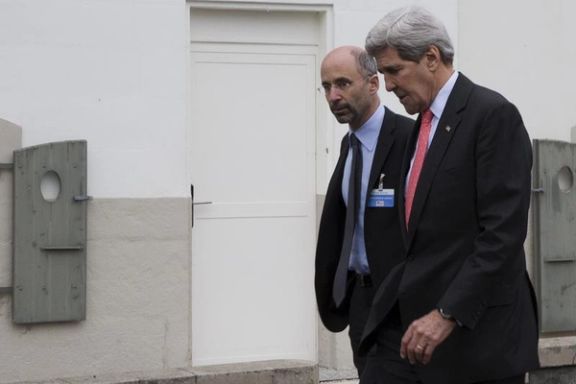White House Denies Report On Interim Deal With Iran

The United States and Iran Thursday both denied a report that they were nearing an interim deal, despite signs that the two sides have been in direct contact.

The United States and Iran Thursday both denied a report that they were nearing an interim deal, despite signs that the two sides have been in direct contact.
"This report is false and misleading," Reuters quoted a spokesperson for the White House National Security Council as saying, referring to an article on the London-based Middle East Eye website. "Any reports of an interim deal are false."
But there have been many similar Western media reports in recent weeks, including the Financial Times.
Iran International reported in May that based on information from a source with direct knowledge, talks between Tehran and Washington for release of Iran’s frozen funds in South Korea in exchange for US citizens held hostage by the Islamic Republic could result in an agreement soon.
Reuters reported that Iran's mission to the United Nations also cast doubt on the report, saying: "Our comment is the same as the White House comment." This was a rare instance of Iran agreeing with the United States on at least one issue.
US and European officials have been searching for ways to curb Tehran's nuclear program since negotiations lasting 18 months broke down last September on reviving the 2015 JCPOA nuclear deal. The talks involving the participants of the accord, France, the United Kingdom, Germany, Russia and China in fact had reached a deadlock in March 2022, immediately after the Russian invasion of Ukraine, but attempts to find a compromise continued until August.
Following the impasse, the United States has repeatedly said it is no longer focused on reviving the JCPOA that was abandoned by former President Donald Trump in 2018. Iran’s military support for Russia and its expanding uranium enrichment have not helped matters.
One possible solution has been an interim deal under which Iran would accept fewer limits on its nuclear program in return for more modest sanctions relief than under the 2015 pact, which removed all nuclear-related economic sanctions.
Middle East Eye cited two unnamed sources as saying Iran and the United States had "reached an agreement on a temporary deal" to take to their superiors.
It said Iran would cease enriching uranium to purity of 60% or above and continue cooperation with the UN nuclear watchdog in return for exporting up to 1 million barrels of oil per day and access to "income and other frozen funds abroad." This report was similar to earlier media scoops about a limited deal.
Oil prices fell by more than $3 a barrel on the Middle East Eye report before paring their losses after the White House denied it.
The website said the talks were led by US special envoy for Iran Rob Malley and Iran's ambassador to the U.N. Amir Saeed Iravani in an apparent reversal of Iran's refusal to deal directly with US officials.

But reports about meetings between the two are also not new. Iran International reported in January that Malley and Iravani had met at least three times in New York in the closing weeks of 2022.
The US State Department has repeatedly declined to comment on any such meetings, saying only that it had ways to pass messages to Iran but would not detail their content or how they were delivered.
Two Iranian officials told Reuters there had been progress, but no agreement was imminent. A third said Malley and Iravani met at least three times in the past weeks but gave no details.
"There (has) been some progress and we have exchanged proposals and messages with Americans," said a senior Iranian official. "Still, there are lots of details that we need to discuss."
Iran has since amassed a stockpile of uranium enriched to 60% and the UN nuclear watchdog has found traces enriched to 83.7%, nearing the 90%